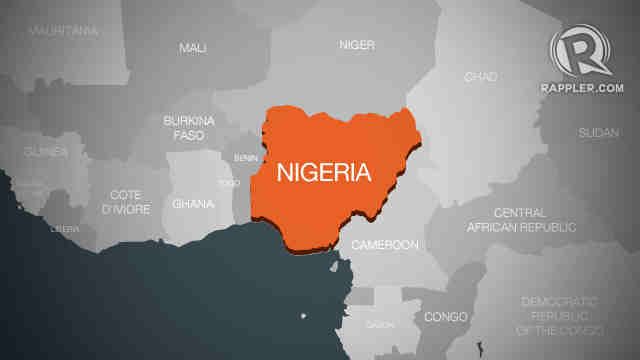SUMMARY
This is AI generated summarization, which may have errors. For context, always refer to the full article.

LAGOS, Nigeria (UPDATED) – “Tens” of people were killed in a huge Christmas Eve blast at an industrial gas plant in southeastern Nigeria, President Muhammadu Buhari said Friday, December 25.
In an emailed press statement, Buhari said he was “greatly shaken and shocked by such large scale loss of human lives in a single industrial accident.”
The blast at the gas plant happened around noon Thursday, December 24, engulfing the southeastern industrial city of Nnewi in black clouds of billowing smoke and leaving some victims charred beyond recognition.
The fire raged for hours, gutting surrounding buildings and cars, with incinerated corpses later found face down in the smouldering rubble.
Nnewi resident Ilochonwu Prince, who lives near the plant, said he thought a house had collapsed when he heard the blast at around 11:30 am on Thursday.
“When there is a sound like that you run for your life, the volume was so high,” Prince said to Agence France-Presse.
“It was the 24th, they wanted to buy gas that they would use with their families for Christmas,” said the 26-year-old student, his voice shaking with emotion.
“I saw four or five bodies that were dead already, the fire burnt them to ashes,” Prince said. “Most of them there, they were people on vacation, and they are just gone like that.”
He said no one knew what set off the explosion because “none of them that were there survived, now nobody has a good story of what actually happened.”
Authorities have given varying tolls.
“It was a huge inferno,” police spokesman Ali Okechukwu told Agence France-Presse. “We have found six bodies outside the perimeter, two more bodies were found in the adjoining building, bringing the total number of casualties to eight.”
Okechukwu, who said a further six people were injured, added that an investigation into the explosion was under way.
– ‘Everything was burnt’ -The gas-fuelled fire spread to a large surrounding area instantly, National Emergency Management Agency (NEMA) spokesman James Eze told Agence France-Presse.
“About 300 metres from the gas line all the plants there were burnt, houses from 400 metres away were affected, heavy machines too,” Eze said, speaking by phone from the Nnamdi Azikiwe University Teaching Hospital where victims of the blast were taken for treatment.
Eze put the total number of casualties at four, barring any missing people who were burnt without any trace.
“The fire (was) so strong as to burn the bones into ashes, but nobody has come forward with a missing person,” Eze said.
There were conflicting accounts too about the cause of the explosion and the authorities have not explained what triggered it.
Some local reports said the blast occurred after a truck was off-loading butane cooking gas for customers stocking up on fuel for Christmas festivities.
Others said it was set off when a leaking consignment of gas was being moved to the company dump.
“The cause is yet to be determined. A few people lost their lives. Some people suffered burns of various degrees,” said Anambra state governor, Willy Obiano, who visited the scene of the accident.
A mainly Christian city, Nnewi is known as a busy hub for trading spare vehicle parts.
Nigeria is Africa’s largest oil producer, deriving the bulk of its money through the commodity.
Accidents happen frequently in the country, usually when pipelines are damaged by people stealing crude oil.
In July, 12 people died and three were injured in an explosion while carrying out repairs on a pipeline in the Niger delta.
Over the past decade, hundreds of people in the continent’s most populous nation have been killed in explosions.
The country loses an estimated 300,000 barrels a day to gangs that syphon crude from pipelines, according to the state-owned Nigerian National Petroleum Corporation. – Stephanie Findlay, AFP/Rappler.com
Add a comment
How does this make you feel?
There are no comments yet. Add your comment to start the conversation.